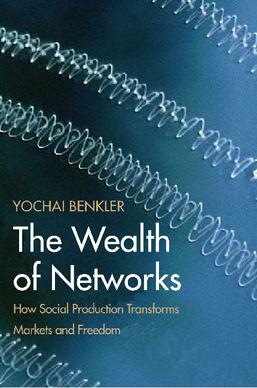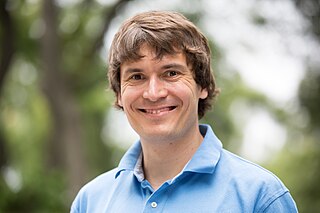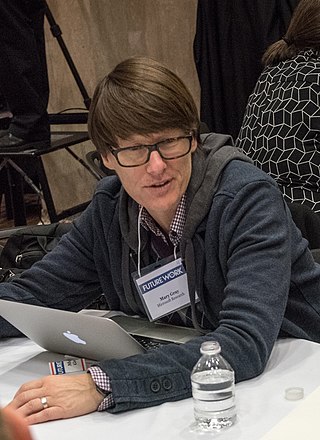Commodification is the process of transforming inalienable, free, or gifted things into commodities, or objects for sale. It has a connotation of losing an inherent quality or social relationship when something is integrated by a capitalist marketplace. Concepts that have been argued as being commodified include broad items such as the body, intimacy, public goods, animals and holidays.
A heterarchy is a system of organization where the elements of the organization are unranked (non-hierarchical) or where they possess the potential to be ranked a number of different ways. Definitions of the term vary among the disciplines: in social and information sciences, heterarchies are networks of elements in which each element shares the same "horizontal" position of power and authority, each playing a theoretically equal role. In biological taxonomy, however, the requisite features of heterarchy involve, for example, a species sharing, with a species in a different family, a common ancestor which it does not share with members of its own family. This is theoretically possible under principles of "horizontal gene transfer".
Self-censorship is the act of censoring or classifying one's own discourse. This is done out of fear of, or deference to, the sensibilities or preferences of others and without overt pressure from any specific party or institution of authority. Self-censorship is often practiced by film producers, film directors, publishers, news anchors, journalists, musicians, and other kinds of authors including individuals who use social media.
Blog fiction is an online literary genre that tells a fictional story in the style of a weblog or blog. In the early years of weblogs, blog fictions were described as an exciting new genres creating new opportunities for emerging authors, but were also described as "notorious" in part because they often uneasily tread the line between fiction and hoax. Sometimes blog fictions are republished as print books, and in other cases conventional novels are written in the style of a blog without having been published as an online blog. Blog fiction is a genre of Electronic literature.

Gatekeeping is the process through which information is filtered for dissemination, whether for publication, broadcasting, the Internet, or some other mode of communication. The academic theory of gatekeeping may be found in multiple fields of study, including communication studies, journalism, political science, and sociology. Gatekeeping originally focused on the mass media with its few-to-many dynamic. Currently, the gatekeeping theory also addresses face-to-face communication and the many-to-many dynamic inherent on the Internet. Social psychologist Kurt Lewin first instituted Gatekeeping theory in 1943. Gatekeeping occurs at all levels of the media structure—from a reporter deciding which sources are presented in a headline story to editors choosing which stories are printed or covered. Including, but not limited to, media outlet owner and advertisers.

The Wealth of Networks: How Social Production Transforms Markets and Freedom is a book by Harvard Law School professor Yochai Benkler published by Yale University Press on April 3, 2006. The book has been recognized as one of the most influential works of its time concerning the rise and impact of the Internet on the society, particularly in the sphere of economics. It also helped popularize the term Benkler coined few years earlier, the commons-based peer production (CBPP).

Good Faith Collaboration: The Culture of Wikipedia is a 2010 book by Joseph M. Reagle Jr. that deals with the topic of Wikipedia and the Wikipedia community. The book was first published on August 27, 2010, through the MIT Press and has a foreword by Lawrence Lessig. The book is an ethnographic study of the history of Wikipedia, its real life and theoretical precursors, and its culture including its consensus and collaborative practices.

Joseph Michael Reagle Jr. is an American academic and writer focused on digital technology and culture, including Wikipedia, online comments, geek feminism, and life hacking. He is Associate Professor of Communication Studies at Northeastern University. He was an early member of the World Wide Web Consortium, based at the Massachusetts Institute of Technology, and in 1998 and 2010 he was a fellow at Harvard University's Berkman Klein Center for Internet & Society.

Produsage is a portmanteau of the words production and usage, coined by German-Australian media scholar Axel Bruns and popularized in his book Blogs, Wikipedia, Second Life and Beyond: From Production to Produsage. Produsage is the type of user-led content creation that takes place in a variety of online environments, open source software, and the blogosphere. The concept blurs the boundaries between passive consumption and active production. The distinction between producers and consumers or users of content has faded, as users play the role of producers whether they are aware of this role or not. The hybrid term produser refers to an individual who is engaged in the activity of produsage. This concept is similar and related to commons-based peer production, a term coined by Yochai Benkler.
Darcia Narvaez is a Professor of Psychology Emerita at the University of Notre Dame who has written extensively on issues of character, moral development, and human flourishing.

Axel Bruns is a German-Australian media scholar. He is a Professor of Communication and Media Studies at QUT Digital Media Research Centre, Queensland University of Technology in Brisbane, Australia, and a Chief Investigator in the ARC Centre of Excellence for Automated Decision-Making and Society.

Dariusz Jemielniak is a professor of management at Kozminski University, faculty associate at the Berkman Klein Center for Internet & Society at Harvard University, and vice-president of Polish Academy of Sciences.
Alan Jacobs is a scholar of English literature and a literary critic. He is a distinguished professor of the humanities in the honors program of Baylor University.
Ernest Mathijs is a professor at the University of British Columbia, where he teaches film. He has published several books on cult films.
Karen Elizabeth Boyle, is Professor of Feminist Media Studies at the University of Strathclyde, previously she was professor of Feminist Studies at the University of Stirling, and before that was a lecturer in film and television studies at the University of Glasgow. She has published a number of articles on feminism, violence and pornography.
Graeme Kirkpatrick is Professor of Social and Cultural Theory at the University of Manchester. He has also worked as Professor in media arts, aesthetics and narration at the University of Skövde in Sweden, and been a visiting Professorial fellow of the Digital Cultures Research Programme at Flinders University in Adelaide.
Convergence culture is a theory which recognizes changing relationships and experiences with new media. Henry Jenkins is accepted by media academics to be the father of the term with his book Convergence Culture: where old and new media collide. It explores the flow of content distributed across various intersections of media, industries and audiences, presenting a back and forth power struggle over the distribution and control of content.

Mary L. Gray is an American anthropologist and author. She is a Fellow at Harvard University's Berkman Klein Center for Internet and Society, as well as a Senior Principal Researcher at Microsoft Research. Along with her research, Gray teaches at Indiana University, maintaining an appointment as an Associate Professor of the Media School, with affiliations in American Studies, Anthropology, and Gender Studies. In 2020, she was awarded a MacArthur Genius Grant in recognition of her work "investigating the ways in which labor, identity, and human rights are transformed by the digital economy."
Daniel Uziel is an Israeli historian and head of photographic collections at Yad Vashem. His doctoral thesis was on the Wehrmacht propaganda corps and was accepted in 2001 by Hebrew University in Jerusalem.

Jill Walker Rettberg is co-director of the Center for Digital Narrative and Professor of Digital Culture at the University of Bergen. She is "a leading researcher in self-representation in social media" and a European Research Council grantee (2018–2023) with the project Machine Vision in Everyday Life: Playful Interactions with Visual Technologies in Digital Art, Games, Narratives and Social Media. Rettberg is known for innovative research dissemination in social media, having started her research blog jill/txt in 2000, and developed Snapchat Research Stories in 2017.








